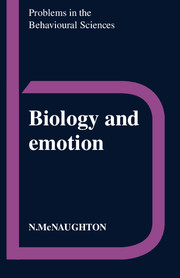Book contents
- Frontmatter
- Contents
- Preface
- Acknowledgements
- 1 Emotion since Darwin
- 2 Releasers and state-dependent reflexes
- 3 Purpose and emotion
- 4 Expression: a window on the emotions?
- 5 Are physiological changes epiphenomena of emotion?
- 6 Somatic influences on the emotions
- 7 Optimal foraging and the partial reinforcement effect: a model for the teleonomy of feelings?
- 8 Do emotions mature or differentiate?
- 9 Cognition, learning and emotion
- 10 Interaction of the components of emotion
- 11 Of mice and men
- 12 Biology and emotion: some conclusions
- Glossary
- Notes
- References
- Index
- Frontmatter
- Contents
- Preface
- Acknowledgements
- 1 Emotion since Darwin
- 2 Releasers and state-dependent reflexes
- 3 Purpose and emotion
- 4 Expression: a window on the emotions?
- 5 Are physiological changes epiphenomena of emotion?
- 6 Somatic influences on the emotions
- 7 Optimal foraging and the partial reinforcement effect: a model for the teleonomy of feelings?
- 8 Do emotions mature or differentiate?
- 9 Cognition, learning and emotion
- 10 Interaction of the components of emotion
- 11 Of mice and men
- 12 Biology and emotion: some conclusions
- Glossary
- Notes
- References
- Index
Summary
Er schuf alsbald noch andere Thiere. Erster Fehlgriff Gottes: der Mensch fand die Thiere nicht unterhaltend – er herrschte über sie, er wollte nicht einmal ‘Thier’ sein.
He immediately made further animals. God's first big mistake: Man didn't find animals amusing – he lorded it over them, and didn't even want to be ‘a beast’.
Friedrich Nietzsche: Der AntichristFrom mouse to monkey to man
In the preceding chapters I have discussed emotional processes and behaviour as if statements about one species would be generally true of a variety of species. This was justifiable, in part because we can assume at least some degree of phylogenetic continuity; in part from the fact that the discussion was aimed at elucidating general principles rather than specific ones; and, in part from the fact that many of the conclusions arrived at were of the form ‘X can occur in some cases but does not in others’. The problems of making simple generalisations about emotional processes are considered further in the last chapter.
In Chapter 1, I specifically suggested that general principles would be most easily seen if we avoided the question of whether any specific emotion was in some sense identical in different species. However, this question cannot be avoided indefinitely. Not only does a biological view of emotion lead one to expect large differences between species in emotional behaviour (e.g. the species-specific defence reactions discussed in Chapter 9); but also, unfortunately, the question is politically ‘loaded’.
- Type
- Chapter
- Information
- Biology and Emotion , pp. 143 - 168Publisher: Cambridge University PressPrint publication year: 1989



